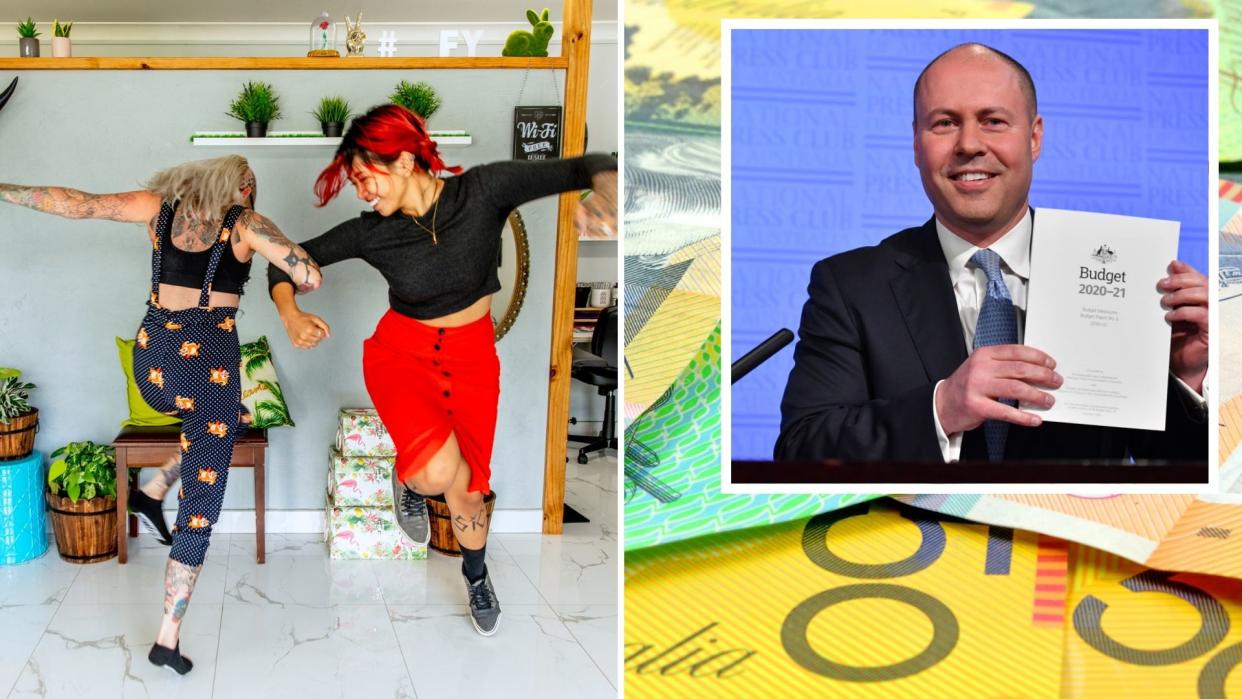3 ways to make your Budget-cash work for you

Last Tuesday, Treasurer Josh Frydenberg dropped a money bomb, announcing that the government is laying out $213 billion dollars more than it will earn in the next financial year. That’s like buying the LA Lakers 50 times over or the Mona Lisa 193 times.
One of the key announcements was backdating income tax cuts to July 1 this year.
But what does that mean exactly?
Well, if you earned between $45,000 and $120,000 last financial year, you’ll be paying less tax. Start calling yourself moneybags because it’s basically free cash.
The government reckons 11 million of us are going to benefit between $1,080 and $2,565 from the tax cuts. Not bad J Fry…not bad at all.
And for those of you wondering why the government is being so generous, here’s the thing – the government is hell bent on averting an economic crisis. The purpose of bringing forward tax cuts is to stimulate the economy.
But here’s where things become a little bit juicy. We had a sneaking suspicion that young Aussies might actually be keeping that money in their pocket, rather than putting it into the economy. So we did a little digging.
In September, the Australian Bureau of Statistics (ABS) reported that the household savings ratio was at the highest levels since…well, ever! We are in the midst of the greatest Australian recession since the 1930s, our effective unemployment rate reached up to 13.3 per cent BUT our household savings ratio has skyrocketed from 6.0 per cent to 19.8 per cent. Go figure!
To make sure the ABS wasn’t playing tricks on us, we ran a survey with the Flux family, our community of over 100,000 Gen Z and young millennials, to see how they’re going to spend their newfound cash and whether the pandemic has caused a fundamental shift in the spending habits of young Aussies.
And it seems like this pandemic has really kicked us into gear. The results showed that 66 per cent of young Aussies are keen to do something smart with this money.
So if you’re not planning to spend this money at your local pizza shop or café (which is a great way to stimulate small business), here are a few ways to make your money work for you.
1. Pay off existing debts
If you’ve got any high interest debts, like credit cards or personal loans, pay them off ASAP. They’re weighing you down like a Zoom meeting at 4pm on a Friday. We know, not the most fun activity – but definitely the most important.
It’s important to have the right financial foundation, including no high-interest debt before making any significant investment decisions. Checking your credit score will help you get an overview of your outstanding debts.
2. Drop it in a high interest savings account
This year, emergency funds have become more important than ever. COVID has had a disproportionate impact on young Aussies and we’ve had to navigate changes to our income and employment.
Placing the extra cash in a high interest savings account is a safe way to make sure you have a financial buffer.
We recommend aiming for at least 3-4 months worth of your expenses in emergency savings, to ensure nothing will ruin that holiday you’ve had to reschedule for 2021.
Some great savings accounts for young people are Westpac’s Life Savings Account with 3 per cent interest or MyState Bank Bonus Saver Account with 1.5 per cent interest.
3. Invest the cash
Investing in the share market is not for the faint-hearted, but it can be a great way to generate wealth in the medium to long-term - especially while bank interest rates are so low.
If you’re setting up an account for the very first time, we strongly recommend doing your research and start by investing an amount you can afford to lose.
And if you’re still unclear where to invest, you should consider putting your money to work in an ETF (Exchange Traded Funds). ETFs are kind of like a mixed smoothie, made up of a range of ingredients (ie companies). They let you invest in a group or category of shares (for instance, consumer-tech shares such as Afterpay, Xero and CarSales), so you don’t need to invest in an individual company (like Afterpay on its own).
The benefit is that you can invest a small amount of money in a range of different shares (hello diversification!), which have been chosen by experts.
Our favourite platforms for investing in ETFs are Betashares (great mix of ETFs, including an Australian tech fund and NASDAQ100) and for general investing, Superhero, which has a great user experience and only costs $5 a trade (the big banks will slug you nearly $20!).
Sign up to become smarter in just 3 minutes. Get the weekly Flux email that makes reading the news actually enjoyable. Stay informed and entertained, for free.
Get insights on your credit score and watch money videos with Flux. Sign up here to join 100,000 members of the Flux family.
Disclaimer: Flux Technologies ABN 86 634 507 172 is an authorised representative (1283166) and a credit representative (525288) of Mozo Pty Ltd who is the holder of AFSL and ACL No 328141. Any product advice presented is of a general nature only, and is not to be taken as any sort of advice as it has not taken into account your personal circumstances, objectives, financial situation or needs. Check out our Financial Services and Credit Guide for more information.
Are you a millennial or Gen Z-er interested in joining a community where you can learn how to take control of your money? Join us at The Broke Millennials Club on Facebook!


